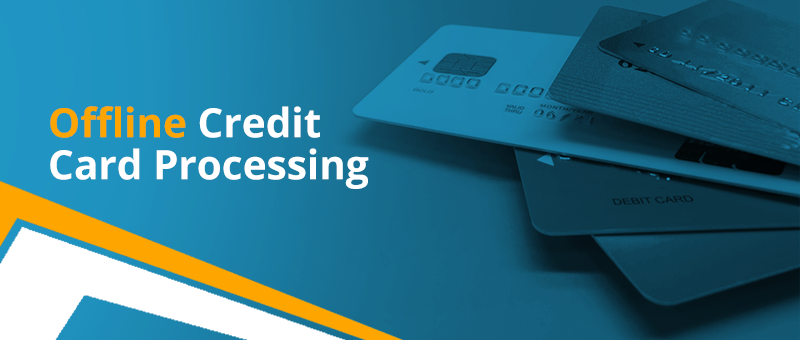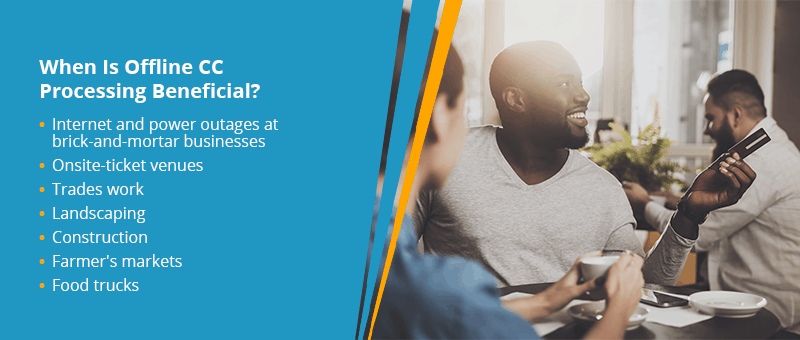
Most Americans own a credit card. That means a majority of the customers, clients, vendors and contractors vital to your business hold the power to pay with plastic. What’s more, credit and debit cards are by far the preferred payment method for over half of Americans today, relegating cash as the go-to practice for only 14%.
All these figures point to a pressing business need — organizations today must be prepared for credit card transactions at all hours and in all retail spaces. However, what happens when your power goes out, your internet acts up or you’re industry requires continual remote or fieldwork? How, then, do you meet today’s top customer preference?
That’s where offline credit card (CC) processing comes in.
How Does Offline Credit Card Processing Work?
Offline transaction processing allows businesses to accept credit card payments in real-time without an internet connection. It’s a contemporary and convenient solution made possible through a new encryption technology that stores and saves vital credit card information — while still keeping your business in compliance with the Payment Card Industry Data Security Standards (PCI DSS).
Typically, a credit card transaction goes like this:
- A cardholder swipes their credit or debit card through a payment machine, known as a terminal.
- That machine uses a secure internet connection to submit the cardholder’s information through your acquiring or merchant bank.
- Your merchant bank receives that information and forwards it to the cardholder’s credit card network, such as Visa, Mastercard, American Express or Discover
- The credit card network then accepts or denies the transaction via an authorization request, using a series of fraud protection tools and account verifications.
- If approved, the cardholder’s issuing bank puts a hold on that individual’s card for the approved purchase amount.
- Your business receives that approval or denial from the CC network, all in a matter of seconds. Your payment terminal then houses the day’s approved transactions, which most businesses typically process in a “batch” at the end of each day.
Without an internet connection, the credit card authorization and verification steps from above cannot take place. Your business has no way of communicating with a credit card network, and therefore has no way of processing or approving any card-based purchases.
However, with an offline transaction terminal, real-time processing can be done. Customers swipe their cards as usual through your terminal. If an internet connection isn’t available at that moment, your device saves and encrypts all necessary cardholder information — something a normal terminal cannot do. As soon as the device reconnects with the internet, it sends that transaction information straight to the merchant bank and credit card network for approval.
When Is Offline Credit Card Processing Beneficial?

Offline card processing is vital across a range of situations, events and industries.
- Internet and power outages at brick-and-mortar businesses: While rare and usually temporary, internet and power outages can wreak havoc on your business. Without any alternative to processing payments, internal operations must come to a grinding halt until accounts and card information can be confirmed.
- Onsite-ticket venues: Keep event or raffle ticket sales flowing with offline credit card terminals set up wherever you’re selling tickets. With so many of today’s consumers carrying cards over cash, these devices are paramount to successful ticketed events, especially when those sales take place at the door.
- Trades work: Electricians, plumbers and other skilled trades services perform the bulk of their work in customers’ homes and businesses. The ease of an offline transaction processing system means you don’t have to worry about setting up cumbersome payment plans over the phone or managing easy-to-lose paperwork between client sites and your office.
- Landscaping: Landscaping and lawncare providers can quickly swipe a customer’s credit card immediately after wrapping up their latest service. That, too, means less paperwork, greater cash flow and increased business stability.
- Construction: Streamline deliveries and vendor payments while on-site across commercial, residential or infrastructure projects.
- Farmer’s markets: Set up shop confidently at local farmer’s markets, neighborhood celebrations and similar events without having to rely on out-of-date cash transactions.
- Food trucks: Take your dishes on the road, widening your brand awareness and customer pool while offering a convenient payment solution regardless of where you park.
Offline Transactions With the Clover Duo
Accepting credit and debit card payments offline remains a fanciful wish for many. With industry-leading payment terminals like the Clover Duo, though, businesses like yours can cross offline transactions from their wish lists and make it an everyday reality.
1. What Is the Clover™ Station?
Clover is a payment terminal device that accepts credit and debit card payments without an active internet connection. It’s a dynamic point-of-purchase system designed to make sales easier, plain and simple.
Using cloud-based technology, Clover accepts and manages offline transactions so you never have to worry about the viability of payments again. Clover also features a complete range of business-critical apps and integrations, from inventory tracking to sales data analytics to an online help function.
We offer Clover devices in many product catalogs, including:
- The Clover Duo: Clover Duos are our all-in-one hardware and software set-up reimaging what a point-of-purchase system can look like, feel like and do. Explore more about Clover Duo to see what they can bring to your business.
- The Clover Mini: Think big sales in a small package. That’s what you get with the Clover Mini, our smallest, lightest and most portable card payment terminal that doesn’t skimp on the affordances.
2. Clover Duo Parameters
Offline transaction processing devices come with a handful of best practices to keep in mind.
- Internet reconnection window: Many terminals will need to reconnect to the internet within a certain time frame to send authorization requests to merchant banks or credit card vendors. If the device doesn’t connect with the internet in that time frame, the charge may expire and you will not get compensated for the transaction.
- Transaction limits: For your own peace of mind, you can set a maximum transaction limit on your Clover device. For example, you can program the terminal to accept offline transactions of $25 or less. Anything larger than that sum will automatically be denied while you’re offline.
- Card expiration, disputes or declines: Offline credit card devices cannot prevent you from taking expired or over-the-limit credit cards. Ensure to check the name and expiration date on every credit and debit card you accept, whether on or offline.
Accept Credit Cards at Any Time, From Anywhere
Don’t be complacent with your business tools. See the convenience, customer support and business care you get from the all-in-one POS Clover system.
We design our credit card terminals to do so much more than accept offline payments. See our industry-leading POS product line, then ask how we can get your new Clover Duo up and running in just 15 minutes.

